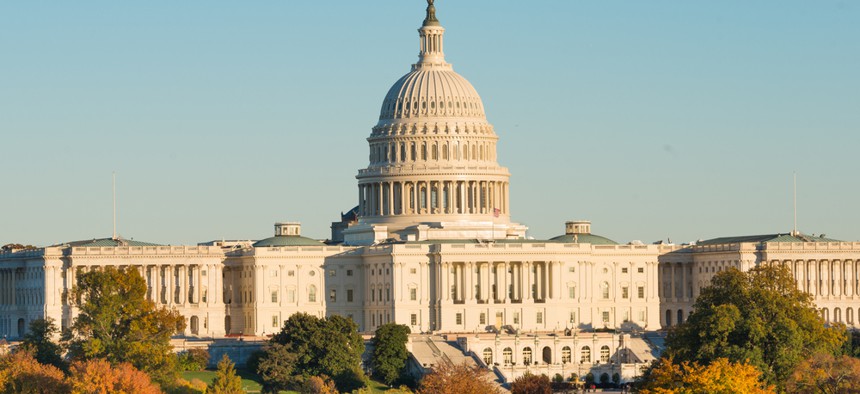
Orhan Cam/Shutterstock.com file photo
Questions and Possible Answers on the Midterm Elections
The mathematics of Senate control after the midterms is increasingly complex.
After the obvious "Who's going to control the Senate after this midterm election?" question, several more questions come up in most political conversations these days. One recurring inquiry focuses on the role of the Affordable Care Act, with many suggesting that it has faded as an issue in the eyes of voters. People who monitor advertising, however, argue with that.
"The ACA is back to being a top issue in these closing weeks, and it probably was never realistic to expect it to remain as dominant as Republicans made it last winter and spring, when they had the extra incentives of undermining enrollment and lousy headlines," says Kantar Media/CMAG chief Elizabeth Wilner, who is also a contributing editor for The Cook Political Report. Earlier this year, GOP strategists began advising their candidates and campaigns to diversify their message, saying that Republicans had milked the Obamacare cow to the point where there was no milk—that is, new support—to be gained. Strategists suggested that Republicans continue to talk about and advertise on the issue to a certain extent, to keep their base energized, but not to come across like a one-trick pony by talking solely about the ACA and the GOP's issues with it.
A newer question being asked is, "How will the Ebola threat and the government's handling of it impact the elections?" My hunch is that this will affect the elections very little; rather, the questions about the Centers for Disease Control and Prevention's response to two cases in the United States amount to another manifestation of public doubt about the broader competence of the administration. The threat of Ebola was a large concern for two focus groups of "Walmart moms" (female swing voters in key battleground states) in Charlotte, North Carolina, and New Orleans this past week. Many were worried about travel; one woman even said she was considering home-schooling her child. Overall, however, the spread of the deadly disease was seen by many as just the latest in a pattern of uncertainty and tragedy that includes the killing of two Americans by ISIS and the unrest in Ferguson, Missouri. Said one mom in Charlotte: "The sad things are becoming familiar."
In that sense, the concern surrounding Ebola is part of a continuum of problems for the administration—among which have been the Internal Revenue Service investigation of conservative groups, Benghazi, problems at the Veterans Affairs Department, and the problematic HealthCare.gov launch—rather than a new and distinct issue. In fact, the women in the focus groups placed most of the blame for the Ebola scare at the feet of the CDC. None of them considered Ebola a voting issue. Those already questioning the competence of the president and his administration very likely see these issues as simply more failings.
Another question heard around the political watercooler of late is whether Democrats can use their turnout magic—the mechanical and technological superiority they demonstrated in the 2008 and 2012 presidential campaigns—to get minority voters and young voters out in big numbers this election. That is a great question. The Democrats' challenge this year is to rekindle the same energy, passion, and commitment that younger voters and minority voters displayed in electing our first African-American president in 2008, and reelecting him 2012. This year, Democrats need to funnel that energy toward moderate, white candidates who are somewhat less inspiring, such as Sens. Kay Hagan, Mary Landrieu, and Mark Pryor. The voters who surged to the polls in 2008 and 2012 are exactly the voters who usually stay home during midterm elections.
A final question that I have been hearing quite often is whether this election will make a difference—whether it has the potential to break up the logjam in Washington. If you are a Republican, you will see obvious value in putting the Senate in GOP hands. However, with a 51-49, 52-48, or even 53-47 majority, will the party be able to get much through the Senate—particularly measures that must pass a much more conservative House—knowing that there are seven Republicans up for reelection in 2016 in states carried by Obama in 2012? Will GOP Senate incumbents, such as Mark Kirk of Illinois or Pat Toomey of Pennsylvania, be willing to embrace legislation that passes the House under the unofficial "Hastert rule"—having the support of a majority of House Republicans—or, in other words, legislation that is pretty conservative stuff? Then there is the issue of getting Obama to sign such legislation, or the daunting task of overriding his veto. Mark me down as a skeptic.
For now, political aficionados have to be content to work out the mathematical equation of what Democrats need to do to hold on to the Senate and, conversely, what equation Republicans need to win the majority.
Outcomes are still far from certain for Democratic incumbents Mark Begich, Jeanne Shaheen, Mark Udall, Hagan, Landrieu, and Pryor, as well as for GOP incumbents Mitch McConnell and Pat Roberts. The results of races for open seats in Georgia, Iowa, and Michigan are also in doubt (some would include South Dakota, but I'm unconvinced). Add the open Democratic seats in Montana and West Virginia that look to be sure turnovers, and there are seemingly infinite combinations of potential results in 2014.
This article appears in the October 25, 2014 edition of National Journal magazine.
(Image via Orhan Cam/Shutterstock.com)






